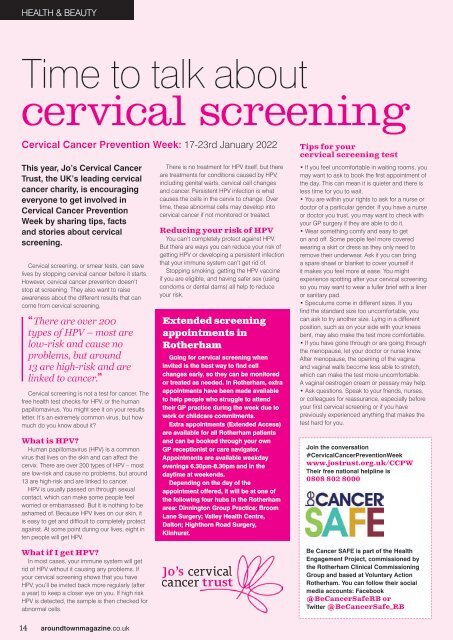Aroundtown Magazine Winter 2022 edition
Read South Yorkshire's premier lifestyle magazine.
Read South Yorkshire's premier lifestyle magazine.
Create successful ePaper yourself
Turn your PDF publications into a flip-book with our unique Google optimized e-Paper software.
HEALTH & BEAUTY<br />
Time to talk about<br />
cervical screening<br />
Cervical Cancer Prevention Week: 17-23rd January <strong>2022</strong><br />
This year, Jo’s Cervical Cancer<br />
Trust, the UK’s leading cervical<br />
cancer charity, is encouraging<br />
everyone to get involved in<br />
Cervical Cancer Prevention<br />
Week by sharing tips, facts<br />
and stories about cervical<br />
screening.<br />
Cervical screening, or smear tests, can save<br />
lives by stopping cervical cancer before it starts.<br />
However, cervical cancer prevention doesn’t<br />
stop at screening. They also want to raise<br />
awareness about the different results that can<br />
come from cervical screening.<br />
‘‘ There are over 200<br />
types of HPV – most are<br />
low-risk and cause no<br />
problems, but around<br />
13 are high-risk and are<br />
linked to cancer.’’<br />
Cervical screening is not a test for cancer. The<br />
free health test checks for HPV, or the human<br />
papillomavirus. You might see it on your results<br />
letter. It’s an extremely common virus, but how<br />
much do you know about it?<br />
What is HPV?<br />
Human papillomavirus (HPV) is a common<br />
virus that lives on the skin and can affect the<br />
cervix. There are over 200 types of HPV – most<br />
are low-risk and cause no problems, but around<br />
13 are high-risk and are linked to cancer.<br />
HPV is usually passed on through sexual<br />
contact, which can make some people feel<br />
worried or embarrassed. But it is nothing to be<br />
ashamed of. Because HPV lives on our skin, it<br />
is easy to get and difficult to completely protect<br />
against. At some point during our lives, eight in<br />
ten people will get HPV.<br />
What if I get HPV?<br />
In most cases, your immune system will get<br />
rid of HPV without it causing any problems. If<br />
your cervical screening shows that you have<br />
HPV, you’ll be invited back more regularly (after<br />
a year) to keep a closer eye on you. If high risk<br />
HPV is detected, the sample is then checked for<br />
abnormal cells.<br />
There is no treatment for HPV itself, but there<br />
are treatments for conditions caused by HPV,<br />
including genital warts, cervical cell changes<br />
and cancer. Persistent HPV infection is what<br />
causes the cells in the cervix to change. Over<br />
time, these abnormal cells may develop into<br />
cervical cancer if not monitored or treated.<br />
Reducing your risk of HPV<br />
You can’t completely protect against HPV.<br />
But there are ways you can reduce your risk of<br />
getting HPV or developing a persistent infection<br />
that your immune system can’t get rid of.<br />
Stopping smoking, getting the HPV vaccine<br />
if you are eligible, and having safer sex (using<br />
condoms or dental dams) all help to reduce<br />
your risk.<br />
Extended screening<br />
appointments in<br />
Rotherham<br />
Going for cervical screening when<br />
invited is the best way to find cell<br />
changes early, so they can be monitored<br />
or treated as needed. In Rotherham, extra<br />
appointments have been made available<br />
to help people who struggle to attend<br />
their GP practice during the week due to<br />
work or childcare commitments.<br />
Extra appointments (Extended Access)<br />
are available for all Rotherham patients<br />
and can be booked through your own<br />
GP receptionist or care navigator.<br />
Appointments are available weekday<br />
evenings 6.30pm-8.30pm and in the<br />
daytime at weekends.<br />
Depending on the day of the<br />
appointment offered, it will be at one of<br />
the following four hubs in the Rotherham<br />
area: Dinnington Group Practice; Broom<br />
Lane Surgery; Valley Health Centre,<br />
Dalton; Highthorn Road Surgery,<br />
Kilnhurst.<br />
Tips for your<br />
cervical screening test<br />
• If you feel uncomfortable in waiting rooms, you<br />
may want to ask to book the first appointment of<br />
the day. This can mean it is quieter and there is<br />
less time for you to wait.<br />
• You are within your rights to ask for a nurse or<br />
doctor of a particular gender. If you have a nurse<br />
or doctor you trust, you may want to check with<br />
your GP surgery if they are able to do it.<br />
• Wear something comfy and easy to get<br />
on and off. Some people feel more covered<br />
wearing a skirt or dress as they only need to<br />
remove their underwear. Ask if you can bring<br />
a spare shawl or blanket to cover yourself if<br />
it makes you feel more at ease. You might<br />
experience spotting after your cervical screening<br />
so you may want to wear a fuller brief with a liner<br />
or sanitary pad.<br />
• Speculums come in different sizes. If you<br />
find the standard size too uncomfortable, you<br />
can ask to try another size. Lying in a different<br />
position, such as on your side with your knees<br />
bent, may also make the test more comfortable.<br />
• If you have gone through or are going through<br />
the menopause, let your doctor or nurse know.<br />
After menopause, the opening of the vagina<br />
and vaginal walls become less able to stretch,<br />
which can make the test more uncomfortable.<br />
A vaginal oestrogen cream or pessary may help.<br />
• Ask questions. Speak to your friends, nurses,<br />
or colleagues for reassurance, especially before<br />
your first cervical screening or if you have<br />
previously experienced anything that makes the<br />
test hard for you.<br />
Join the conversation<br />
#CervicalCancerPreventionWeek<br />
www.jostrust.org.uk/CCPW<br />
Their free national helpline is<br />
0808 802 8000<br />
Be Cancer SAFE is part of the Health<br />
Engagement Project, commissioned by<br />
the Rotherham Clinical Commissioning<br />
Group and based at Voluntary Action<br />
Rotherham. You can follow their social<br />
media accounts: Facebook<br />
@BeCancerSafeRB or<br />
Twitter @BeCancerSafe_RB<br />
14 aroundtownmagazine.co.uk
















